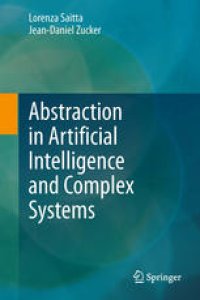
Ebook: Abstraction in Artificial Intelligence and Complex Systems
- Tags: Artificial Intelligence (incl. Robotics), Image Processing and Computer Vision, Data Mining and Knowledge Discovery, Computer Appl. in Arts and Humanities
- Year: 2013
- Publisher: Springer-Verlag New York
- Edition: 1
- Language: English
- pdf
Abstraction is a fundamental mechanism underlying both human and artificial perception, representation of knowledge, reasoning and learning. This mechanism plays a crucial role in many disciplines, notably Computer Programming, Natural and Artificial Vision, Complex Systems, Artificial Intelligence and Machine Learning, Art, and Cognitive Sciences. This book first provides the reader with an overview of the notions of abstraction proposed in various disciplines by comparing both commonalities and differences. After discussing the characterizing properties of abstraction, a formal model, the KRA model, is presented to capture them. This model makes the notion of abstraction easily applicable by means of the introduction of a set of abstraction operators and abstraction patterns, reusable across different domains and applications. It is the impact of abstraction in Artificial Intelligence, Complex Systems and Machine Learning which creates the core of the book. A general framework, based on the KRA model, is presented, and its pragmatic power is illustrated with three case studies: Model-based diagnosis, Cartographic Generalization, and learning Hierarchical Hidden Markov Models.
Abstraction is a fundamental mechanism underlying both human and artificial perception, representation of knowledge, reasoning and learning. This mechanism plays a crucial role in many disciplines, notably Computer Programming, Natural and Artificial Vision, Complex Systems, Artificial Intelligence and Machine Learning, Art, and Cognitive Sciences. This book first provides the reader with an overview of the notions of abstraction proposed in various disciplines by comparing both commonalities and differences. After discussing the characterizing properties of abstraction, a formal model, the KRA model, is presented to capture them. This model makes the notion of abstraction easily applicable by means of the introduction of a set of abstraction operators and abstraction patterns, reusable across different domains and applications. It is the impact of abstraction in Artificial Intelligence, Complex Systems and Machine Learning which creates the core of the book. A general framework, based on the KRA model, is presented, and its pragmatic power is illustrated with three case studies: Model-based diagnosis, Cartographic Generalization, and learning Hierarchical Hidden Markov Models.
Abstraction is a fundamental mechanism underlying both human and artificial perception, representation of knowledge, reasoning and learning. This mechanism plays a crucial role in many disciplines, notably Computer Programming, Natural and Artificial Vision, Complex Systems, Artificial Intelligence and Machine Learning, Art, and Cognitive Sciences. This book first provides the reader with an overview of the notions of abstraction proposed in various disciplines by comparing both commonalities and differences. After discussing the characterizing properties of abstraction, a formal model, the KRA model, is presented to capture them. This model makes the notion of abstraction easily applicable by means of the introduction of a set of abstraction operators and abstraction patterns, reusable across different domains and applications. It is the impact of abstraction in Artificial Intelligence, Complex Systems and Machine Learning which creates the core of the book. A general framework, based on the KRA model, is presented, and its pragmatic power is illustrated with three case studies: Model-based diagnosis, Cartographic Generalization, and learning Hierarchical Hidden Markov Models.
Content:
Front Matter....Pages i-xvi
Introduction....Pages 1-9
Abstraction in Different Disciplines....Pages 11-47
Abstraction in Artificial Intelligence....Pages 49-63
Definitions of Abstraction....Pages 65-116
Boundaries of Abstraction....Pages 117-139
The $mathcal{KRA }$ KRA Model....Pages 141-177
Abstraction Operators and Design Patterns....Pages 179-222
Properties of the $mathcal{KRA }$ Model....Pages 223-271
Abstraction in Machine Learning....Pages 273-327
Simplicity, Complex Systems, and Abstraction....Pages 329-362
Case Studies and Applications....Pages 363-387
Discussion....Pages 389-405
Conclusion....Pages 407-411
Back Matter....Pages 413-484
Abstraction is a fundamental mechanism underlying both human and artificial perception, representation of knowledge, reasoning and learning. This mechanism plays a crucial role in many disciplines, notably Computer Programming, Natural and Artificial Vision, Complex Systems, Artificial Intelligence and Machine Learning, Art, and Cognitive Sciences. This book first provides the reader with an overview of the notions of abstraction proposed in various disciplines by comparing both commonalities and differences. After discussing the characterizing properties of abstraction, a formal model, the KRA model, is presented to capture them. This model makes the notion of abstraction easily applicable by means of the introduction of a set of abstraction operators and abstraction patterns, reusable across different domains and applications. It is the impact of abstraction in Artificial Intelligence, Complex Systems and Machine Learning which creates the core of the book. A general framework, based on the KRA model, is presented, and its pragmatic power is illustrated with three case studies: Model-based diagnosis, Cartographic Generalization, and learning Hierarchical Hidden Markov Models.
Content:
Front Matter....Pages i-xvi
Introduction....Pages 1-9
Abstraction in Different Disciplines....Pages 11-47
Abstraction in Artificial Intelligence....Pages 49-63
Definitions of Abstraction....Pages 65-116
Boundaries of Abstraction....Pages 117-139
The $mathcal{KRA }$ KRA Model....Pages 141-177
Abstraction Operators and Design Patterns....Pages 179-222
Properties of the $mathcal{KRA }$ Model....Pages 223-271
Abstraction in Machine Learning....Pages 273-327
Simplicity, Complex Systems, and Abstraction....Pages 329-362
Case Studies and Applications....Pages 363-387
Discussion....Pages 389-405
Conclusion....Pages 407-411
Back Matter....Pages 413-484
....